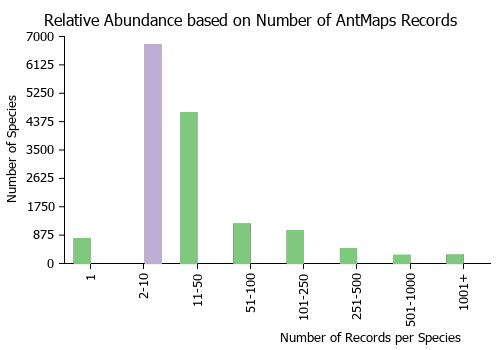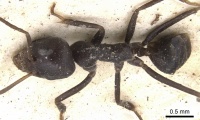Anonychomyrma glabrata
| Anonychomyrma glabrata | |
|---|---|

| |
| Scientific classification | |
| Kingdom: | Animalia |
| Phylum: | Arthropoda |
| Class: | Insecta |
| Order: | Hymenoptera |
| Family: | Formicidae |
| Subfamily: | Dolichoderinae |
| Tribe: | Leptomyrmecini |
| Genus: | Anonychomyrma |
| Species: | A. glabrata |
| Binomial name | |
| Anonychomyrma glabrata (Smith, F., 1857) | |
Identification
Distribution
Latitudinal Distribution Pattern
Latitudinal Range: 2.374167° to 2.374167°.
| North Temperate |
North Subtropical |
Tropical | South Subtropical |
South Temperate |
- Source: AntMaps
Distribution based on Regional Taxon Lists
Indo-Australian Region: Malaysia (type locality).
Distribution based on AntMaps
Distribution based on AntWeb specimens
Check data from AntWeb
Countries Occupied
| Number of countries occupied by this species based on AntWiki Regional Taxon Lists. In general, fewer countries occupied indicates a narrower range, while more countries indicates a more widespread species. |

|
Estimated Abundance
| Relative abundance based on number of AntMaps records per species (this species within the purple bar). Fewer records (to the left) indicates a less abundant/encountered species while more records (to the right) indicates more abundant/encountered species. |

|
Biology
Anonychomyrma species are common in moist to semi-arid forested areas (and are less common in rain forests). They nest either in soil with or without coverings, or arboreally in living or dead wood. Workers forage in conspicuous trails on the ground and on tree trunks. Although not studied in detail, they seem to be general predators and also collect plant juices. Some species are associated with the caterpillars of selected butterflies. Nest sizes are moderate to large, ranging from 500 to tens of thousands of workers. When disturbed, most species elevate their gasters and release strong, acrid smelling chemicals as a defensive measure. While similar to Iridomyrmex in general habitat preferences and ecology, most Anonychomyrma prefer moister sites and are predominately arboreal. Iridomyrmex species occur in drier sites and are predominantly terrestrial.
Castes
Worker
Images from AntWeb

| |
| Syntype of Anonychomyrma glabrata. Worker. Specimen code casent0901920. Photographer Will Ericson, uploaded by California Academy of Sciences. | Owned by OUM, Oxford, UK. |
Nomenclature
The following information is derived from Barry Bolton's Online Catalogue of the Ants of the World.
- glabrata. Tapinoma glabrata Smith, F. 1857a: 58 (w.) WEST MALAYSIA.
- Combination in Iridomyrmex: Mayr, 1886c: 356;
- combination in Anonychomyrma: Shattuck, 1992a: 13.
- Status as species: Smith, F. 1858b: 56; Roger, 1863b: 13; Mayr, 1863: 455; Smith, F. 1871a: 309; Dalla Torre, 1893: 169; Forel, 1895e: 468; Emery, 1913a: 25; Donisthorpe, 1932c: 445; Chapman & Capco, 1951: 190; Shattuck, 1994: 5; Bolton, 1995b: 66.
The following notes on F. Smith type specimens have been provided by Barry Bolton (details):
Tapinoma glabrata
Three worker syntypes in Oxford University Museum of Natural History. Labelled “Mal 32.”
Description
References
- Mayr, G. 1886c. Notizen über die Formiciden-Sammlung des British Museum in London. Verh. K-K. Zool.-Bot. Ges. Wien 36: 353-368 (page 356, combination in Iridomyrmex)
- Shattuck, S. O. 1992a. Review of the dolichoderine ant genus Iridomyrmex Mayr with descriptions of three new genera (Hymenoptera: Formicidae). J. Aust. Entomol. Soc. 31: 13-18 (page 13, combination in Anonychomyrma)
- Smith, F. 1857a. Catalogue of the hymenopterous insects collected at Sarawak, Borneo; Mount Ophir, Malacca; and at Singapore, by A. R. Wallace. [part]. J. Proc. Linn. Soc. Lond. Zool. 2: 42-88 (page 58, worker described)

